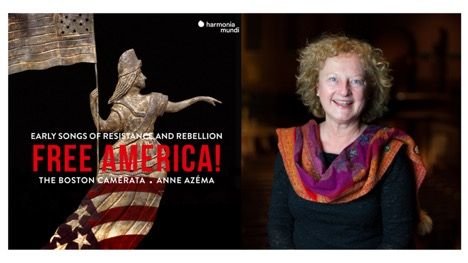Boston Camerata: Early Songs of Resistance and Rebellion

Listen
WHRB Classical producer Allison Pao sat down with Anne Azema, soprano and artistic director of the Boston Camerata to discuss the Boston Camerata’s recently released album “Free America! Early Songs of Resistance and Rebellion.” Listen to the full interview above or read on for highlights.
AP: My first question is, how did you come up with the concept of this album? What led you to the theme?
AA: Several things. First of all, the Boston Camerata has been doing several albums of American music for a while now and if one looks at the history of the ensemble, I think in the late 70s already, there were some American music included in programs done by the ensemble under the direction of our former director Joel Cohen.
And for me, several things triggered this project. One was a commission by the Philharmonie de Paris. They came to us to invite us to perform two concerts and illustrate in our concert how we are connected to Boston and [answer the question] what does it mean to be “the” Boston Camerata? So of course, we, with pleasure, created two different programs, one which was spiritual in nature and the other one more political, and that was the birth of “Free America! Early Songs of Resistance and Rebellion.” Then as a follow up, Harmonia Mundi, an international recording label, came to us saying, we'd like to do a project with you. And since we were already in France where they are based, we thought, well, there it is. And I think another thing needs to be mentioned, which is that we are an American ensemble. We do what’s called early music, which is by and large repertoire from before the 1800s. But still, we are a bunch of Americans. And it's an important focus of ours to consider: what is our connection to our patrimonial musical path? The combination of all these things, made it natural for us to conceive that program, record it, and now share it in Boston on November 8th.
AP: My next question is: how did you go about finding all these songs? Were they all full notated or did you have to add some layers of interpretation or harmony to any of them?
AA: With most of our work, not everything is done and prepared for us…however, we are in the odd part of the repertoire. It's not really classical music in the way you know – Mendelssohn, Beethoven, Mozart – type of music, but it's not folk music, not really pop music either, because it was notated. So that really defines something very precisely. For example, you have recycling of pre-existing pieces, a piece in the city called wise, Columbia. has been recycled from a British English piece by Thomas Arne “Rule Britannia,” and the words were changed to share a message about the early republic. But there are other instances of music that come from army marches, marches to go to battle and so forth which will present a different moment in history. Yankee Doodle is one example. It functions as a march independently, but it also has many sets of different texts and none of them are the ones you learned at school. If you come to our concerts, you'll be somewhat surprised! And there are other instances of music that we've included here which come from collections that were published in New Hampshire or around us [in Massachusetts] in the early 19th century…So it's a combination of many texts, many musical sources, sometimes put together then in the 18th century, sometimes put together by us. But in general, these are pieces that were printed, shared, and whose job was also to propagate thoughts that were relevant then and perhaps also now.
AP: You write in your liner notes for this album that these songs were “intuited by non-professional musicians for non-professional use.” But you also mentioned earlier that this is not quite pop music because the songs were notated. What kinds of people were these that were notating these songs that were perhaps more amateur or not written strictly in what we think of as traditional western classical forms?
AA: Well, for example, we have the case of William Billings, one of the most important American composers from Boston, who was a tenor. He composed one of the most moving American pieces called David’s Lamentation, on the splitting of America on the stories of the Tories...And he was a tenor. He hadn't been formed and taught by the conservatory. And yet this very powerful, powerful piece was meant to be sung by people who got together in meeting houses and built their own community by singing together and sharing these powerful texts and music. Singing together is one of the most powerful socializing tools that you can have when you build a new community. And that's what I mean by amateurs. From amateurs to amateurs who are trying to find their place in the new society, and by singing together, they create new, steady, stable groups to participate and govern the new city.
Allison Pao is a producer for WHRB Classical. You can hear her Monday evenings 7-10pm and Thursday mornings 5-7am.